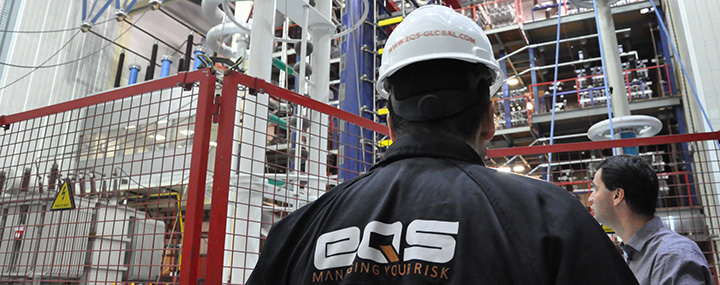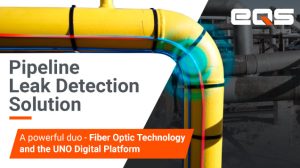Asset Management Consulting & Technical Audits
High-demanding industries depend on strong levels of availability from their critical assets, even in the most demanding environments. At the same time, high safety levels and legal compliance must be assured.
Through technical advisory services and independent verifications, during fabrication, construction, operation, and decommissioning, EQS Global seeks to guarantee technical and legal assurance, reliability, and asset performance.
- ISO 55000Asset Management Systems
- Maintenance Audits & Diagnostics
- Field Surveys & Asset Portfolio Update
- Creation & Implementation of Maintenance Strategies
- Creation & Optimization of Maintenance Plans
- Creation of Technical Specifications for Service Providers
- Evaluation of Service Providers
- RCM Studies - Reliability Centered Maintenance
- Reliability & Availability Studies
ISO 55000Asset Management Systems
The world faces constant financial performance, environmental sustainability, and social responsibility challenges. To meet the triple bottom line, organizations must embrace a new way of thinking and managing their assets, at all lifecycle stages.
There is a tremendous need to ensure an alignment in decision-making at all levels, in order to deliver value from critical assets at an acceptable risk. This will dramatically affect the way companies manage assets, increasing production, optimizing costs, and improving profitability. The transition to a reliability-focused asset management culture represents the first step to achieving the organization’s strategic objectives.
Publicly Available Specification 55 (PAS 55) and ISO 55000, applicable to any organization where physical assets are a key or a critical factor, reflect the increasing international consensus about the good practices required in physical assets’ management.
Maintenance Audits & Diagnostics
EQS Global conducts audits and diagnostics for the maintenance management system review and cost optimization, through an action plan focused on value creation. After the diagnosis, a plan will be proposed that is consistent with the needs of each company in order to achieve a leaner system.
EQS Global approach is based on an efficient and assertive audit, at the end of which an action plan, previously debated and approved with the client, is issued. The implementation phase of the actions is also subject to close monitoring by our maintenance team.
A good plan of action is as important as the cooperation and feeling of ownership of the maintenance management team’s elements. It is therefore fundamental to ensure complete follow-up, as well as training, during the change process.
Field Surveys & Asset Portfolio Update
The asset portfolio is the starting point for any maintenance management system. It is therefore fundamental to keep the asset registry updated.
Using advanced technological methods of collection, EQS Global team identifies or restores the identification of the assets while collecting their technical characteristics, location, and conservation status.
The updated portfolio is available for upload to any CMMS.
Creation & Implementation of Maintenance Strategies
The choice of a preventive, predictive, or even corrective maintenance strategy is related to the specific needs and objectives of the organization and business.
A methodical and structured approach will allow you to select the ideal strategies for each moment in your assets’ life.
With a multidisciplinary engineering team and decades of accumulated experience in asset management, EQS Global seeks to add value in the process of designing and implementing maintenance strategies.
Creation & Optimization of Maintenance Plans
After selecting the strategy to follow in asset management, it will be necessary to prepare a maintenance plan. EQS Global, through its know-how and manufacturer recommendations, develops preventive, predictive maintenance plans as well as lubrication and inspection plans.
This planning allows the definition of more appropriate methodologies for the assets of our clients, reducing costs and making them more efficient.
Creation of Technical Specifications for Service Providers
In the procurement process, whether of an asset or a service, as important as the acquisition value is the cost of its life cycle and the cost of managing a contract, respectively. A document with adjusted technical specifications, definition, levels of service, performance indicators, and incentives, guarantees the success of the acquisition.
In this sense, EQS Global works under the prerogative of designing specifications for its clients that comply with budgets and deadlines and are in compliance with the current legislation, thus contributing to excellence in project execution.
Evaluation of Service Providers
The importance of the work of service providers is reflected in several stages of the production process, influencing even the quality of the final product/ service. Service delivery contracts need, therefore, to be monitored in terms of their performance.
EQS Global, through its Maintenance Service Provider Tracking System (APSM), monitors the actual level of service provided through audits. Deviations at the contracted level will be corrected through follow-up meetings with the service provider.
Actual and contracted service levels, as well as correction plans, will be available on a web platform for quick customer consultation.
RCM Studies – Reliability Centered Maintenance
RCM (Reliability Centered Maintenance) studies represent a method recognized for its effectiveness in identifying strategies and maintenance tasks for rotating equipment.
Improvements in cost-effectiveness, and knowledge of risk factors, among others, are some of the advantages obtained and treated through RCM studies.
Reliability & Availability Studies
Reliability and availability studies represent methods related to asset life cycle predictions, through the analysis of reliable data, providing solutions for optimizing maintenance and predicting failures.
These studies are based on a statistical analysis of asset data in order to determine, among others, the following indicators:
-MTBF (Mean Time Between Failures);
-MTTR (Mean Time To Repair);
-MDT (Mean Down Time);
-B%life;
-Failure Rate.
Through these indicators, EQS Global maintenance and reliability management team supports its clients in developing the most appropriate strategy for their assets.

Energy Audits
Energy Audits aim to assess the use of energy in buildings and industrial plants to define the consumption structure and identify opportunities to improve.
In Portugal the current legislation includes compliance with the following laws:
DL68-A/2015 of April 30th
– Applicable to non-Small and Medium Enterprises (SME’s)
– Independent and Profit Energy Audit, with identification of opportunities for improvement
DL 118/2013 of August 20th refers to the Energy Certification System
– Determination of the energy class
– Definition of the improvement measures
DL 71/2008 of April 15th refers to Management System for Energy Intensive Consumption
– Detailed energy audit, including balances of energy and mass by process, product, or energy system
– Definition of the Rationalization Energy Consumption Plan, through the establishment of the measures to be implemented.

Buildings Energy Certification
Energy certification is the responsibility of homeowners and is mandatory in many contexts. In Portugal, according to DL 118/2013 of August 20th, all properties that are to be sold, rented, or leased must have an Energy Certificate issued by a Qualified Expert, taking into account the following regulations:
– Energy Certification Regulation of Small and Large Commercial Buildings and Services – RECS
– Regulation of Energy Certification of Housing – REH.
The Energy Certificate provides information to the prospective buyer, renter or lessee, about the expected energy consumption, in normal use of the building, as well as, identifies measures of energetic performance improvement, which can be implemented to achieve a reduction in energy costs. In this way, the Energy Certificate contributes to a greater saving in the energy invoice, improvement of the thermal comfort, reduction of CO2 emissions, and valuation of the property in a future transaction.
The Energy Classification is influenced by the uplifting characteristics of the dwelling (such as type, materials, and thickness of walls, roofing, glazing, orientation, etc.), use of renewable energies, ventilation systems (natural or mechanical), fuels used in climatic and hot water production (in short are the energy needs for air conditioning, in general terms heating and cooling, and for the production of CSAs that determine the energy performance class).
EQS Global has a team of Qualified Experts who guarantee the issuance of Energy Certificates in a short time and with the information that enables the improvement of the energy efficiency of the fraction.
EQS Global has a technical team with high know-how in order to guarantee the success of the Energy Audit and the definition of improvement measures, through the implementation of appropriate energy management methodologies. In order to follow the measures implemented, the concept of Measurement and Verification Performance arises and should be adopted to compare the effectiveness of different actions and to attest to the impact of changes in the overall system consumption. These systematization procedures lead to the correction of undesirable switches and control the effects of long-term changes.
Request a Quotation
Click here to fill the form





